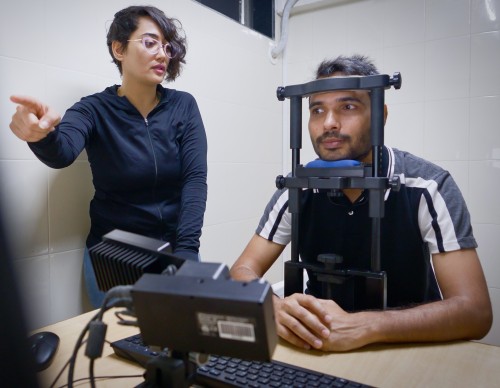The Psychophysiology Laboratory (Prof. Azizuddin Khan)

The Psychophysiology Laboratory at IIT Bombay undertakes both basic and applied research using approaches from experimental cognitive psychology, psychophysiology, cognitive neuroscience and criminal psychology. The physiological methods of research used include EEG, Event Related Potential, galvanic skin response, neuro-feedback and eye-tracking. Behavioural measurement is also carried out using softwares like E-Prime, the Iowa Gambling Task and Time estimation, as well as psychometric tools like the Stroop task and Wisconsin Card Sorting Task. A high priority is placed on the applied aspect of research and currently the topics under study include learning disabilities, depression, medical decision-making and creativity. There is an emphasis on understanding the brain mechanisms underlying these phenomena, so as to use this knowledge to promote healthy living and overall well-being of human beings.
Instruments
Electroencephalogram BIOSEMI 72 Channel
Eyelink 1000, eyetracker.
Electroencephalogram- NEXUS 32
Neurofeedback
Psychological Test
Dyslexia Screening Test
Stroop Task
Cambridge Test of Prospective Memory
Wisconsin Card Sorting Task( Computerized)
Software
BESA Research 6.0
E-PRIME 2.0 Professional
Time Estimation
Prospective Memory Assessment
Iowa Gambling Task
Collaborations
- Angela Basarra, Analisis intragrupal de los modellos de redes sociales a contextos educativos y laborales: influencia en la eficiencia individual, grupal y organizacional with Angel Barrasa, University of Milagro, Ecuador
- Goal directed Future Cognition: Neural and Cognitive mechanisms underpinning the successful completion of planned and intended behavior and actions. UGC-UKIERI, Professor. Judi Ellis ,University of Reading , UK.
- Developmental dyslexia in India and the Netherlands: A cross-linguistic perspective, Prof. Anna Bosman Radboud University, The Netherlands.
- Developmental dyslexia, Paavo Leppanen and Jarmo Hamalainen, University of Jyvaskyla, Finland.
- Cognitive functions of hyperthyroidism, Dr. Nazan Dolu, Faculty of Medicine, Erciyes University, Turkey.
- Competencias mediáticas audiovisuales en jóvenes de 14 al 18 años, docents y padres de familiade instituciones educativas de las nueve zonas de planificación de Ecuador. Universidad de Cuenca
E-mail: psychophysiologylab@hss.iitb.ac.in ; khanaziz@iitb.ac.in
Telephone No:+91 22 2576 4360